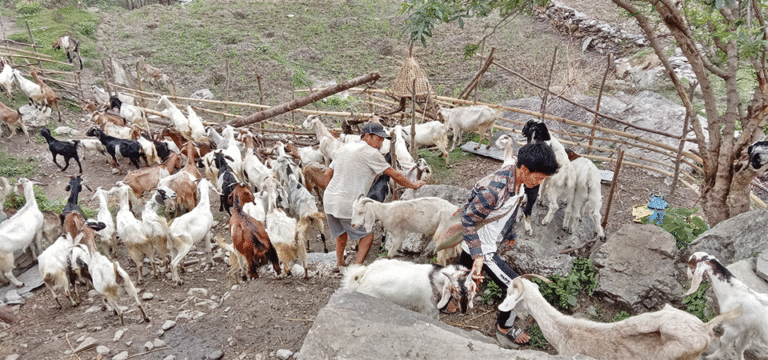
Dek Prasad Garbuja, who spent years for foreign employment in Qatar and Kuwait from 1992 to 2008, now saves more than Rs. 300,000 annually by returning to the ancestral occupation.
Garburja, 51, of Raghuganga Rural Municipality-5 of the district is now enjoying goat rearing.
He said that he was satisfied with the business in his own house. Goat rearing is the main occupation of goats, buffaloes and cattle raised by the hard work of the family members only.
At present, there are 115 goats in his farm. Garbuja is also well supported by his wife Devi Garbuja, 50, and son Ram Garbuja, 29.
“Due to the hard work of the family members, I have been able to make my animal husbandry business so successful,” said Garbuja.
He, who had been in animal husbandry business in the past but did not operate it commercially by registering with the government body, registered the business farm in 2018.
Garbuja had registered a goat farm at the Cottage and Small Industries Office and started raising goats commercially with an investment of Rs. 600,000. He had spent Rs. 600,000 on construction of a shed and purchase of goats.
According to Garbuja, the goats in the farm alone are worth more than Rs. 2 million at present.
“I went to Kuwait in 1992, but no matter how hard I worked, I could not earn even Rs. 8,000 to 10,000 a month,” he said. “I spent almost 16 years in Kuwait and Qatar, but I was not able to earn as much as I thought and the goal I had set. I have focused on the animal husbandry that my father and grandfather had been doing. After registering the farm and starting to take care of the business, it has become profitable now.”
The goats produced in Jhin, which can be reached in about three hours by vehicle from the district headquarters Beni, are being supplied to the provincial capital, Pokhara.
“Now I was supposed to take 10 goats to Pokhara by vehicle, but I could not bring them due to the lockdown. If it is open, they will be taken immediately,” he said
Rishikesh Tiwari, who has been trading meat in Beni, said that the goats produced by Garbuja are low in fat and the taste of the meat is good as they are grown in the mountain.
According to Tiwari, the price of a goat is around Rs. 20,000.
Garbuja, who raises local goats, including Boer crossed, Jamunapari and Khari, has been saving more than Rs. 300,000 annually by deducting all the expenses.
Ram Garbuja said that he is happy to be able to stay in the village by saving more than Rs. 300,000.
Source : THE RISING NEPAL,






